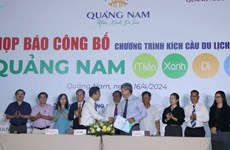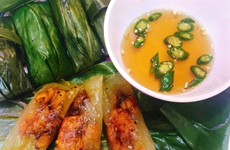Tram Chim National Park offers experience tours
The wild rice biome also known as the “spirit rice” (Oryza Rufipogon) is
now being protected and preserved at Tram Chim National Park (Dong
Thap) on the area of 800 hectares.
The wild rice biome also known as the “spirit rice” (Oryza Rufipogon) is
now being protected and preserved at Tram Chim National Park (Dong
Thap) on the area of 800 hectares.
The rice is currently on the harvest season and the National Park is offering wild rice harvest tours.
The wild rice is grown mostly at the preservation areas of Phu Hiep, Phu Duc and Phu Thanh of Tram Chim National Park . The wild rice usually becomes ripe for harvest in November or December. The grain has the yellow and black cover.
The wild rice is fully grown during the flood season; therefore farmers have to use canoes to harvest.
This variety of wild rice can resist alum and water. It can grow higher than the water level which is 3 to 5 metre deep.
The plant rises 0.1 to 0.15 metre each day above the water lever when the floodwater rises high. Wild rice can stand among the strong water and becomes food for many species. The wild rice is a food supply source to maintain the wetland ecosystem here. The rice is small but glutinous and sweet.
During this season, The National Park organises tours to experience wild rice harvest, said Le Hoang Long – Director of Tourism and Environmental Education Centre of Tram Chim National Park.
Harvest sites for tourists are located at Phu Hiep and Phu Duc areas, accounting for 16 percent of total wild rice paddy in the Park. The tour will give tourists the opportunity to experience the wild rice cropping and help them understand more about the livelihood of Dong Thap Muoi residents during the flood season.
The preserved wild rice area has also helped researchers to study the speciality of this variety of rice and to create new variety for the region in the context of climate change.
Tram Chim National Park currently has a rich vegetation with over 130 varieties of vascular plants, 6 kinds of specific biomes includes: lotus, wild rice (Oryza rufipogon), water chestnut (eleocharis), tropical grasses (ischaemum), bullet grass (panicum repens) and cajuput forest, said Director of Tram Chim National Park Nguyen Van Hung.-VNA
The rice is currently on the harvest season and the National Park is offering wild rice harvest tours.
The wild rice is grown mostly at the preservation areas of Phu Hiep, Phu Duc and Phu Thanh of Tram Chim National Park . The wild rice usually becomes ripe for harvest in November or December. The grain has the yellow and black cover.
The wild rice is fully grown during the flood season; therefore farmers have to use canoes to harvest.
This variety of wild rice can resist alum and water. It can grow higher than the water level which is 3 to 5 metre deep.
The plant rises 0.1 to 0.15 metre each day above the water lever when the floodwater rises high. Wild rice can stand among the strong water and becomes food for many species. The wild rice is a food supply source to maintain the wetland ecosystem here. The rice is small but glutinous and sweet.
During this season, The National Park organises tours to experience wild rice harvest, said Le Hoang Long – Director of Tourism and Environmental Education Centre of Tram Chim National Park.
Harvest sites for tourists are located at Phu Hiep and Phu Duc areas, accounting for 16 percent of total wild rice paddy in the Park. The tour will give tourists the opportunity to experience the wild rice cropping and help them understand more about the livelihood of Dong Thap Muoi residents during the flood season.
The preserved wild rice area has also helped researchers to study the speciality of this variety of rice and to create new variety for the region in the context of climate change.
Tram Chim National Park currently has a rich vegetation with over 130 varieties of vascular plants, 6 kinds of specific biomes includes: lotus, wild rice (Oryza rufipogon), water chestnut (eleocharis), tropical grasses (ischaemum), bullet grass (panicum repens) and cajuput forest, said Director of Tram Chim National Park Nguyen Van Hung.-VNA













